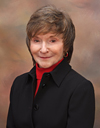 Juicy Work Coaches
Juicy Work Coaches
Meet Margaret Echols
What does “Juicy Work” mean to you?
Executive coaching is the work that fulfills and sustains me. It is the intersection of my strengths, my passions, and the needs of those I work with. I am able to bring all of my past experience, training, and “know-how” to bear. As I coach, I feel that this is the work I was born to do, whether coaching individuals, teams, or Georgetown University Leadership Coaching Program students.
Can you give an example of how you helped someone find their “Juicy Work” through coaching?
I once worked with a senior executive who had a bit of a culture shock when he began working for a new organization. After working with a coach for several months, someone suggested he work with me. I conducted a 360-degree assessment by interviewing his colleagues so he could see how he was perceived in the organization. He realized the picture that emerged was not the one he desired. We created specific goals and actions to help him become a more emotionally intelligent leader. He received feedback that he had become engaged, open, calm, and more able to achieve success through developing—rather than simply directing—others. The following year he was promoted.
How else have you used coaching?
I developed a team action coaching process, adapted from action learning, which I use to coach teams and team members to work together more effectively. In one case, I coached a team of managers over a period of seven months on how to help their staff work more collaboratively and have honest and sometimes difficult conversations. This resulted in the team helping each other solve problems by asking powerful questions and listening deeply instead of giving advice.
How have you seen “Juicy Work” impact a whole organization?
As senior manager in a small strategy group at Coopers & Lybrand (C&L), we took 150 partners through a year-long internal strategic planning process, which resulted in a reorientation of C&L as a professional services firm rather than an accounting firm. The process had a cascade effect in energizing the entire workforce around a broader vision for serving clients.
What is it like for someone to work with you as a coach?
I relate to the challenges leaders face because I have been in their shoes—not all coaches can say that. I help my clients get clear on their overall goals and then help them create measurable, actionable goals to take them to their ultimate goal. I’m straightforward with my clients, and I give them targeted feedback—feedback from others and feedback from my own observations. My approach combines rigor and lightness to foster creativity, flexibility, and rapid learning.
Can you tell us about your background?
In some ways, I am the role model for the “corporate athlete” described by Tony Schwartz (Harvard Business Review, 2001). I believe in being fit to lead, manage, and coach. I am a cycling enthusiast and yoga practitioner. Clients who work with me learn that sustained high achievement demands not only intelligence, but also physical and emotional strength. I help them bring their bodies, minds, and spirits to higher levels of fitness to achieve peak performance. I introduce practices to assess physical health, emotional strength and resilience, and spiritual well-being. From this, clients are more able to take action to achieve healthier lifestyles and step into their passions—including the juicy work they love.
My articles on coaching are part of the Georgetown University faculty book, On Becoming a Leadership Coach: A Holistic Approach to Coaching Excellence.
